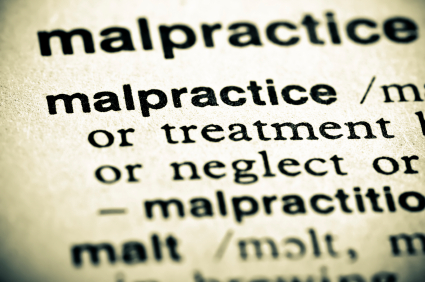 If you feel you’ve suffered because of a doctor’s professional negligence or lawyer’s professional negligence, then you may want to consider filing a malpractice lawsuit.
If you feel you’ve suffered because of a doctor’s professional negligence or lawyer’s professional negligence, then you may want to consider filing a malpractice lawsuit.
Legal and Medical Malpractice
Legal malpractice is actually a form of negligence in which a lawyer breaches his contract or fiduciary relationship and causes harm to a client. That said, the majority of malpractice lawsuits take the form of medical malpractice.
Medical malpractice occurs when a doctor or nurse fails to exercise the level of care that a doctor or nurse of the same medical specialty would be expected to exercise under similar circumstances.
Medical Malpractice and Medical Error
In other words, a doctor was supposed to do one thing, failed his professional duties and did another, which resulted in the patient’s harm or suffering. The majority of cases of medical malpractice involve a medical error, or a preventable adverse outcome of medical care.
An example of a medical malpractice lawsuit involving medical error would be a patient who received a wrong or partial diagnosis and subsequently went on to experience an injury and unnecessary suffering.
Although doctors frequently have professional liability insurance to protect against medical malpractice lawsuits should a medical error occur, you can still bring a medical malpractice lawsuit against a doctor if you feel professional negligence caused your suffering.
Misdiagnosis and Medical Malpractice
A large percentage of successful malpractice lawsuits started with partial or belated diagnoses or plain misdiagnoses. Just consider that when a physician makes the wrong call and either fails to provide the right diagnosis or does so too late the patient unnecessarily suffers.
Going back to the definition of medical malpractice, a successful malpractice lawsuit will depend on proving that a more competent physician with the same medical expertise operating under similar circumstances would have made the correct diagnosis.
Statistics on Medical Malpractice Lawsuits
Very few doctors are totally immune from the threat of a medical malpractice lawsuit. In fact, the New England Journal of Medicine found that three-fifths of low-risk doctors will combat a medical malpractice lawsuit during their practicing lifetime while nearly all doctors in high-risk professions will combat a medical malpractice claim.
Further, in 2012 nearly four billion dollars was awarded to clients in medical malpractice payouts. California was one of the highest states in terms of medical malpractice payouts – nearly a quarter billion dollars annually goes towards medical malpractice payouts in California.
Fives states – California, Florida, New Jersey, Pennsylvania and New York – account for 48% of all medical malpractice payouts. That said, the vast majority of payouts related to medical malpractice relate to settlements (93%) rather than judgments.
Causes for Medical Malpractice Lawsuits
One-third of medical malpractice claims are related to a misdiagnosis, which makes misdiagnosis the most common reason for filing a medical malpractice lawsuit.
When a doctor fails to provide a correct and complete diagnosis to his patient and subsequently faces a malpractice lawsuit, the doctor failed to act as competently as another doctor of the same medical speciality operating under similar circumstances.
Surgery and treatment, respectively, were the next most frequent reasons behind medical malpractice lawsuits. Also, in most medical malpractice lawsuits the most severe injury is significant permanent injury or death.
When to File a Medical Malpractice Lawsuit
If you feel you have suffered due to the professional negligence of a doctor, then you may want to consider a medical malpractice lawsuit.
Although misdiagnosis is the number one cause behind medical malpractice lawsuits, medical errors (e.g., incorrect prescriptions) as well as surgical mistakes account for a large share of medical malpractice lawsuits.
 dismissed your case without a hearing. You ask more questions and discover that your attorney failed to file your claim within the time required by law. The first question that comes to your mind is, “Can I sue my lawyer?” The answer is “Yes.”
dismissed your case without a hearing. You ask more questions and discover that your attorney failed to file your claim within the time required by law. The first question that comes to your mind is, “Can I sue my lawyer?” The answer is “Yes.”